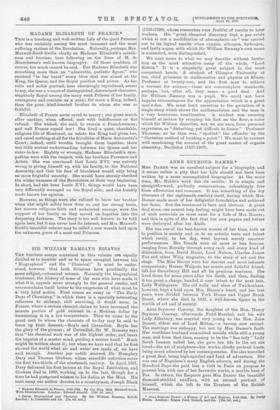SIR WILLIAM RAMSAY'S ESSAYS.f
THE fourteen essays contained in this volume are equally divided as to number and as to space occupied between the "Biographical" and the "Chemical." It must be under- stood, however, that both divisions have practically the same subject,—chemical science. Naturally the biographical treatment, the history of some of the men who have made it what it is, appeals more strongly to the general reader, and accommodates itself better to the exigencies of what must be a very brief notice. First comes an essay on "The Early Days of Chemistry," in which there is a specially interesting reference to alchemy, still surviving, it would seem, in France, where a certain chemist claims to have increased the minute portion of gold existent in a Mexican dollar by hammering it in a low temperature. Then we come to the great men to whom the chemists of to-day may be said to trace up their descent,—Boyle and Cavendish. Boyle has the glory of the pioneer ; of Cavendish, Sir W. Ramsay says that "his chemical work was of the highest order, and bears the imprint of a master mind, guiding a master hand." Much might be written about it; but when we have said that be first showed the world what air and water are made of, we have said enough. Another par nobile succeed, Sir Humpliry Davy and Thomas Graham, whose scientific activities cover the first two-thirds of the nineteenth century. In April, 1801, Davy delivered his first lecture at the Royal Institution, and Graham died in 1869, working up to the last, though for a time he had postponed science to his duties at the Mint. His next essay our author devotes to a countryman, Joseph Blaek * Madame Elisabeth de France, 1784-176.4. By the Hon. Mrs. Maxwell-Scott. With Illustrations. London Edward Arnold.. [128. 6d. net.] t Essays Biographical and Chemical. By Sir William Ramsay, K.C.B. London: A. Constable and Co. [7e. 6d. net.]
(178-1799), whose researches were fruitful of results to later workers. His "great chemical discovery that a gas exists which is not a modification of atmospheric air" was carried out to its logical results when oxygen, nitrogen, hydrogen, and lastly argon, with which Sir William Ramsay's own name is connected, were distinguished.
We next come to what we may describe without hesita- tion as the most attractive essay of the whole, "Lord Kelvin." It is a singularly great subject in the most competent hands. A student of Glasgow University at ten, chief prizemun in mathematics and physics at fifteen, Professor at twenty-two, and the first man to achieve a coronet for science,—these are commonplace standards. perhaps, but, after all, they mean a good deal. And Sir William Ramsay was a pupil. We could not have happier circumstances for the appreciation which is a great man's due. We must limit ourselves to the quotation of a single story which shows the mathematician and the man in a very humorous combination. A student was amusing himself at lecture by scraping his foot on the floor, a noise which Sir William describes, not, we are sure, from personal experience, as "disturbing, yet difficult to locate." Professor Thomson, as he then was, "spotted" the offender by the "Cartesian method of locating a point" ! We must be content with mentioning the account of the great master of organic chemistry, Berthelot (1827-1907).






















































 Previous page
Previous page